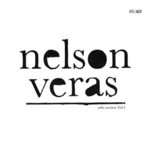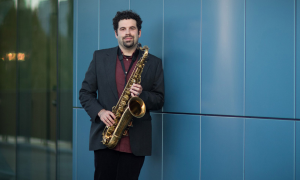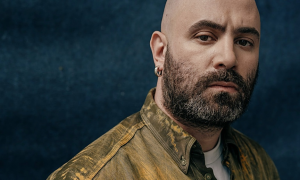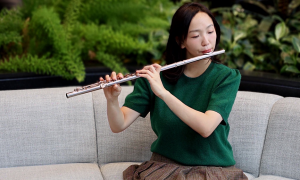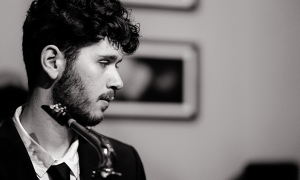Home » Jazz Articles » Take Five With... » Take Five with John Evans
Take Five with John Evans
 Born in New York City, Evans started piano lessons at age four. A few years later, John saw the movie "The Benny Goodman Story" and was inspired to learn how to play the clarinet. He went to the school band teacher hoping to check out a clarinet, but, as luck would have it, everyone else had seen the movie the day before and there were no more clarinets. The band teacher told John that they only had one alto sax left, so John started playing alto. In the sixth grade, he switched to tenor sax and continued playing tenor for nearly twenty years, studying briefly with Clifford Jordan in the late sixties.
Born in New York City, Evans started piano lessons at age four. A few years later, John saw the movie "The Benny Goodman Story" and was inspired to learn how to play the clarinet. He went to the school band teacher hoping to check out a clarinet, but, as luck would have it, everyone else had seen the movie the day before and there were no more clarinets. The band teacher told John that they only had one alto sax left, so John started playing alto. In the sixth grade, he switched to tenor sax and continued playing tenor for nearly twenty years, studying briefly with Clifford Jordan in the late sixties.Evans served in the US Army with a tour in South Korea as an entertainment specialist, booking USO shows, playing in combos and doing shows for the troops in isolated areas. He started showing an interest in the electric bass. Completing his tour of duty, he returned to New York (1970), he continued freelancing on tenor.
Finding it difficult to earn a good living playing saxophone in Manhattan, Evans switched to electric bass and almost immediately was working full time. Prior to becoming a free-lance recording musician, John held the bass chair for a series of shows on Broadway...The Original Godspell...The Magic Show with Doug Henning...Evita...and some lesser known shows.
Studied composition and arranging. Evans has composed, arranged and produced music for Sports Illustrated and Time Life.
Worked with David Sanborn on the RIAA, Certified Gold, Grammy Nominated, Hideaway album. Evans composed and co-penned "Creeper" with Sanborn. It was the tune that became the single release from the album.
Formed The John Evans Band. They were fortunate enough to be one of the New York bands that often played at Mikell's, a well-known musicians' hangout at that time. Hiram Bullock, Paul Shaffer, Steve Jordan, Clifford Carter, Doane Perry, Lou Volpe and other session musicians were, at times, a part of the band.
Played Late Night with David Letterman. The Late Night band at the time was Paul Shaffer, Steve Khan (who was filling in for Hiram Bullock), Steve Jordan and Evans (who was filling in for Neil Jason), who was subbing for Will Lee.
Moved to Los Angeles. Worked with Elliott Randall, Cornell Dupree, Jeff Baxter, Tom Pierson's Big Band and a host of others.
Evans now lives with his wife, writer and lyricist, Sandy Evans, in Texas. He has just released his second John Evans & Dream album, The Winding Road on Studio Records.
Instrument(s): Piano, bass, saxophone, guitar, percussion.
Teachers and/or influences? Influences:
Saxophone: Charlie Parker, John Coltrane, Illinois Jacquet, Stanley Turrentine, Coleman Hawkins, Lester Young, Ben Webster, Cannonball Adderly, David 'Fathead' Newman, Maceo Parker, Junior Walker, King Curtis, Paul Desmond, Stan Getz, Hank Crawford, Clifford Jordan, David Sanborn, Michael Brecker, Wayne Shorter.
Trumpet: Miles Davis, Freddie Hubbard, Lee Morgan, Louis Armstrong, Dizzy Gillespie, Randy Brecker.
Trombone: J.J.Johnson, Bob Brookmeyer, Kai Winding, Bill Watrous.
Keyboard: Bill Evans, Oscar Peterson, Errol Garner, Ray Charles, Keith Jarrett, Dave Brubeck, Sergio Mendes, Chick Correa, Herbie Hankcock, Jimmy Smith, Richard "Groove" Holmes, Wynton Kelly, Joe Zawinul, Eddie Palmieri, Charlie Palmieri, Jan Hammer, Don Grolnick, Richard Tee.
Guitar: Django Reinhardt, Grant Green, Herb Ellis, Charlie Byrd, Kenny Burrell, Les Paul, Wes Montgomery, Eric Clapton, John McLaughlin, Carlos Santana, George Benson, Cornell Dupree, Eric Gale, Pat Metheny, Steve Khan, Hiram Bullock.
Bass: Ray Brown, Charlie Mingus, Paul Chambers, Oscar Pettiford, James Jameson, Steve Swallow, Chuck Rainey, Jaco Pastorius, John Patatucci, Will Lee, Israel 'Cachao' Lopez.
Drums: Art Blakey, Buddy Rich, Joe Morello, Elvin Jones, Jimmy Cobb, Jack DeJohnette, Billy Cobham, Bernard Purdie, Steve Gadd, Steve Jordan. Percussion: Tito Puente, Mongo Santamaria, Ray Barretto, Ralph McDonald, Sammy Figueroa.
Singers: Ella Fitzgerald, Billie Holiday, Nina Simone, Mel Torme, Antonio Carlos Jobim, Astrud Gilberto, Joao Gilberto, Nat Cole, Frank Sinatra, Mel Torme, Lambert, Hendricks, & Ross, Sam Cooke, Marvin Gaye, Aretha Franklin, Rufus Thomas, Curtis Mayfield, James Brown, Tina Turner, Chaka Khan.
Composer/Arranger: Bach, Beethoven, Mozart, Vivaldi, Henry Mancini, Quincy Jones, Clare Fischer.
I knew I wanted to be a musician when... I saw the movie, "The Benny Goodman Story." I had always enjoyed music and my family encouraged me, but when I was sixteen, I played my first concert to a crowd of about four hundred people...I was hooked.
Your sound and approach to music: The time feel has to be relaxed, no matter what the tempo. I write and arrange all of the music on my albums so I try my best to keep the harmonic structure interesting enough to keep the soloists happy, while, at the same time, keeping it accessible to non-musicians.
I guess you could say that I play jazz for people who don't know what jazz is.
Your dream band: I've been pretty fortunate in terms of whom I've worked with in the past. I miss a lot of guys that I once knew who are no longer here, like Hiram Bullock, Michael Brecker, Don Grolnick, and Richard Tee.
I'm very fortunate to have to have a wonderful group of musicians and singers with me now. They are all extremely talented, well-educated, and really tune in to what I'm trying to do.
Your favorite recording in your discography and why?
I'll have to admit that doing the Hideaway album with David Sanborn was the most significant album for me, particularly in terms of knowledge acquired.
Although, the album I'm working on right now might turn out to be my favorite.
The first Jazz album I bought was: Jimmy Smith's Back At The Chicken Shack. Stanley Turrentine, Kenny Burrell and Don Bailey... good stuff.
What do you think is the most important thing you are contributing musically? Music that makes peoples lower their shoulders and relax. I like to see people sway back and forth. Life is short...we don't need more things to make us up tight.
Did you know... I like to cook.
CDs you are listening to now: I don't listen to music when I'm working.
How would you describe the state of jazz today? I'm tired of sampled drum beats.
What are some of the essential requirements to keep jazz alive and growing? Making music that doesn't require a performance degree to enjoy.
What is in the near future? Currently recording the next John Evans & Dream album at Studio Records.
If I weren't a jazz musician, I would be a: Chef.
Tags
PREVIOUS / NEXT
Support All About Jazz
 All About Jazz has been a pillar of jazz since 1995, championing it as an art form and, more importantly, supporting the musicians who make it. Our enduring commitment has made "AAJ" one of the most culturally important websites of its kind, read by hundreds of thousands of fans, musicians and industry figures every month.
All About Jazz has been a pillar of jazz since 1995, championing it as an art form and, more importantly, supporting the musicians who make it. Our enduring commitment has made "AAJ" one of the most culturally important websites of its kind, read by hundreds of thousands of fans, musicians and industry figures every month.



